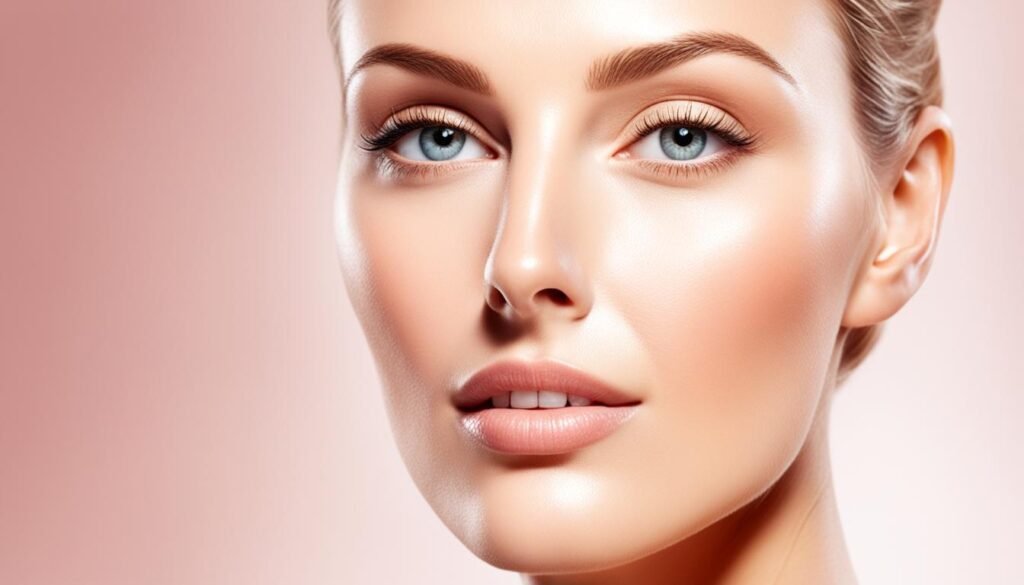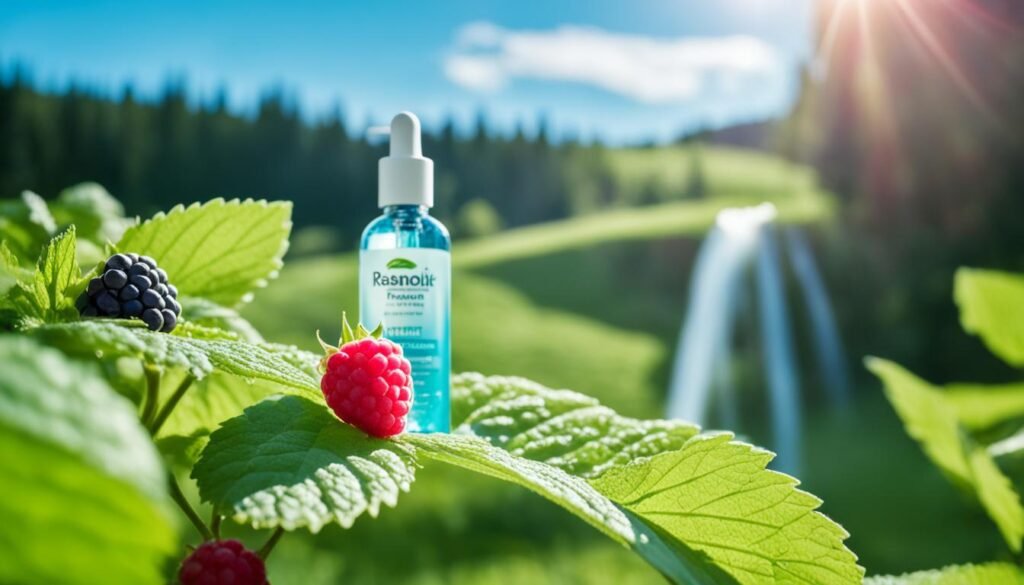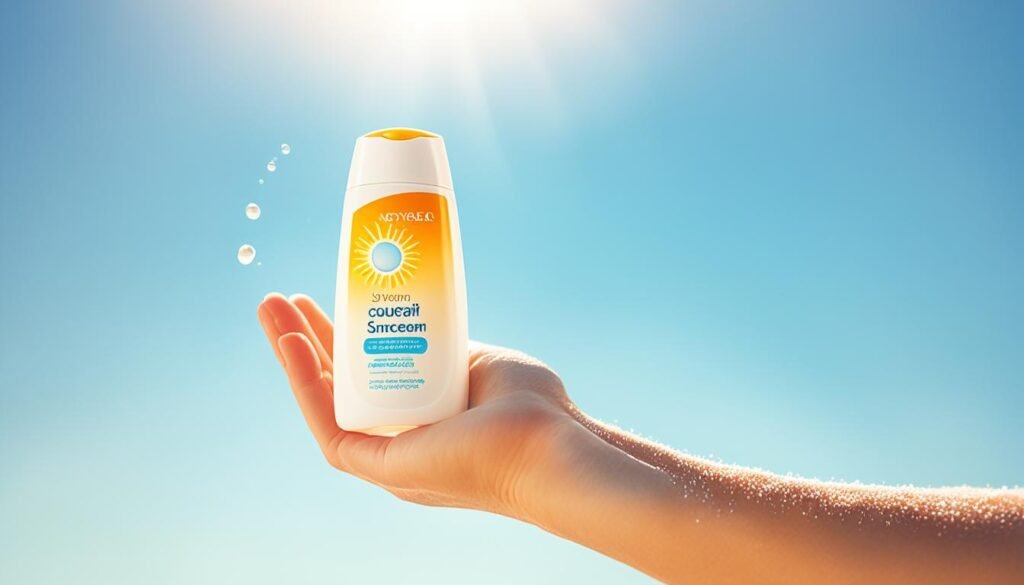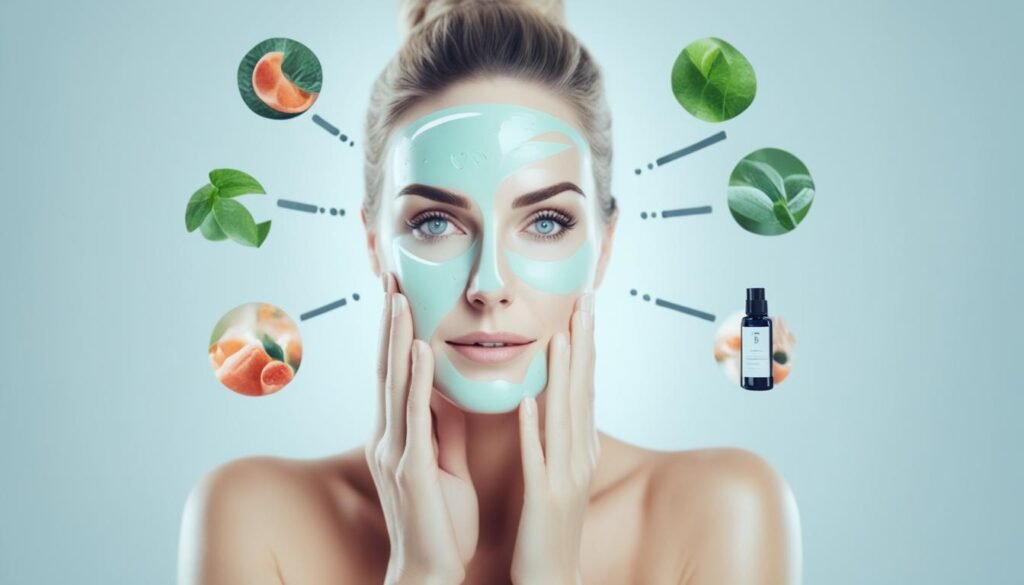Did you know that our skin loses approximately 500 milliliters of water each day? That’s equivalent to losing a can of soda in just 24 hours! This staggering fact showcases the constant battle our skin faces to maintain hydration and prevent dryness. Thankfully, there is a powerful ally in this fight: antioxidants. These natural compounds offer a range of benefits for the skin, including boosting hydration, protecting against aging, and promoting overall skin health. In this article, we will explore the role of antioxidants in skin hydration and uncover the secrets to achieving healthier, more moisturized skin.
Key Takeaways:
- Antioxidants play a crucial role in maintaining skin hydration and promoting overall skin health.
- They protect against free radicals and oxidative stress, which can lead to aging and cell damage.
- Incorporating antioxidants into your skincare routine and diet can contribute to healthier, hydrated skin.
- Topical skincare products and a diet rich in fruits, vegetables, and supplements are excellent sources of antioxidants.
- Choosing the right skincare products for your skin type and following precautions is essential for optimal results.
Understanding Antioxidants and Their Function
Antioxidants play a critical role in maintaining skin health by protecting against cell damage caused by free radicals and oxidative stress. Free radicals are highly reactive molecules that can accelerate the aging process and contribute to various diseases. The body is exposed to oxidative stress through metabolic activities and external factors like pollution and tobacco smoke.
Antioxidants, both synthetic and natural, act as scavengers, neutralizing free radicals and preventing or delaying cell damage. They can be found abundantly in fruits, vegetables, and supplements. Ongoing research suggests that antioxidants offer a range of benefits for the skin, including protection against harmful UV radiation, improved hydration, stimulation of collagen and elastin production, and reduction in the appearance of wrinkles and pigmentation.
The Role of Antioxidants:
The primary function of antioxidants is to counteract the harmful effects of free radicals and oxidative stress. By neutralizing these unstable molecules, antioxidants help prevent cell damage and promote overall skin health. The specific benefits of antioxidants for the skin include:
- Protection against aging: Antioxidants can combat the damaging effects of free radicals, which contribute to the aging process. By reducing oxidative stress, antioxidants help maintain youthful and healthy-looking skin.
- Improved skin health: Antioxidants play a crucial role in enhancing skin health by promoting hydration, stimulating collagen and elastin production, and supporting the skin’s natural rejuvenation process.
- Defense against UV damage: Certain antioxidants possess photoprotective properties, meaning they can shield the skin from the harmful effects of ultraviolet (UV) radiation. This protection helps prevent sunburn, skin cancer, and photoaging.
To illustrate the potential benefits of antioxidants for skin health, consider the following:
| Antioxidant | Benefit |
|---|---|
| Vitamin C | Boosts collagen production and brightens the skin |
| Vitamin E | Protects against UV damage and promotes hydration |
| Resveratrol | Has anti-inflammatory effects and supports overall skin health |
When it comes to skincare, incorporating antioxidant-rich products into your routine can contribute to healthier and more resilient skin. Whether applied topically or consumed through a nutritious diet, antioxidants provide essential protection against cell damage, helping to maintain a youthful complexion and promoting lasting skin health.
Antioxidants for Skin Health

When it comes to maintaining healthy and radiant skin, antioxidants play a crucial role. These powerful compounds protect the skin from damage caused by free radicals, oxidative stress, and environmental factors. Incorporating antioxidants into your skincare routine can provide numerous benefits, including skin protection, hydration, and collagen production.
One of the key groups of antioxidants for skin health is vitamins A, C, and E. Skincare products formulated with these vitamins offer a range of benefits. Vitamin A, also known as retinol, promotes cell turnover, enhances collagen production, and reduces the appearance of fine lines and wrinkles. Vitamin C brightens the skin, evens out skin tone, and protects against UV damage. Vitamin E provides antioxidant protection, soothes inflammation, and supports skin cell regeneration.
Selenium and zinc are essential minerals that also contribute to skin health. Selenium helps protect the skin from sun damage and supports antioxidant enzymes in the body. Zinc plays a role in collagen synthesis, wound healing, and maintaining the skin’s integrity. These minerals are commonly found in skincare products and can help inhibit wrinkle formation while supporting overall skin cell renewal.
Carotenoids, such as beta carotene, lutein, and lycopene, are another group of antioxidants that benefit the skin. These natural pigments give fruits and vegetables their vibrant colors and have been shown to contribute to skin health and appearance. Carotenoids help improve skin tone, protect against UV damage, and enhance hydration.
Flavonoids and glutathione are additional antioxidants known for their skin-protective and anti-inflammatory effects. Flavonoids, found in fruits, vegetables, and tea, help reduce oxidative stress and support collagen synthesis. Glutathione, produced naturally by the body, has powerful antioxidant properties and helps maintain skin health.
By incorporating antioxidants into your skincare routine, you can enhance your skin’s natural defenses, promote hydration, and stimulate collagen production. Whether through topical products or a diet rich in antioxidant-rich foods, antioxidants can help you achieve healthier, more vibrant skin.
The Power of Natural Antioxidants
Natural antioxidants derived from fruits, vegetables, and other plant-based sources have gained significant recognition for their remarkable skin-enhancing properties. These natural sources boast a plethora of vitamins, minerals, carotenoids, and flavonoids that contribute to skin health and vitality.
Consuming fruits and vegetables, such as blueberries, oranges, spinach, and kale, can provide a rich array of natural antioxidants that benefit the skin. These antioxidants work together to combat free radicals, protect against oxidative stress, and reduce inflammation, ultimately improving skin texture and promoting a youthful appearance.
Studies have also suggested that specific natural antioxidants, like vitamin E, can effectively manage various skin conditions. For example, individuals with vitiligo, atopic dermatitis, and acne might find relief and improvement in their symptoms by incorporating vitamin E-rich foods and supplements into their diet.
Moreover, a well-rounded diet with ample natural antioxidants can support overall skin health by nourishing the body with essential nutrients. The holistic approach of consuming these antioxidants from natural sources, rather than relying solely on supplements, ensures a diverse range of beneficial compounds that work synergistically to optimize skin health.
Embracing a balanced diet rich in fruits, vegetables, and antioxidant supplements provides a reliable foundation for promoting skin health and enhancing the natural radiance of the skin. By harnessing the power of natural antioxidants, individuals can nourish their skin and unlock its true potential.
Fruits and Vegetables Packed with Natural Antioxidants
| Fruit | Antioxidants |
|---|---|
| Blueberries | Anthocyanins |
| Oranges | Vitamin C |
| Spinach | Lutein |
| Kale | Flavonoids |
References:
- “Natural antioxidants and their benefits for skin health.” Journal of Dermatological Science.
- “Incorporating antioxidants into your diet for healthier skin.” Journal of Clinical Dermatology.
- “The role of vitamin E in managing skin conditions.” Journal of Dermatological Research.
Antioxidant-Rich Skincare Products

When it comes to skincare, antioxidants play a crucial role in protecting and nourishing your skin. Many skincare products on the market today are formulated with powerful antioxidants that deliver their benefits directly to your skin. These products are designed to enhance your skincare routine and provide targeted solutions for various skin concerns.
Vitamin C is a popular antioxidant ingredient found in many skincare products. It is highly regarded for its ability to brighten the skin, fade dark spots, and protect against damage caused by the sun’s harmful UV rays. Incorporating vitamin C into your skincare regimen can help you achieve a more radiant complexion and improve overall skin tone.
“Vitamin C is a potent antioxidant that can protect your skin from oxidative stress and free radicals, which can lead to premature aging,” says Dr. Emily Richardson, a renowned dermatologist. “Including skincare products with vitamin C can help boost collagen production, improve skin texture, and reduce the appearance of fine lines and wrinkles.”
Retinoids, derived from vitamin A, are another group of antioxidants commonly used in skincare products. They are widely recognized for their anti-aging properties, as they can improve skin texture, stimulate collagen production, and reduce the appearance of wrinkles. Incorporating retinoids into your skincare routine can help you achieve smoother and more youthful-looking skin.
“Retinoids are effective in promoting cellular turnover and enhancing the production of collagen, which contributes to skin renewal and a more youthful appearance,” advises Dr. Samantha Adams, a board-certified dermatologist. “However, it’s important to use retinoids with caution and follow the instructions provided to avoid potential skin irritation and sun sensitivity.”
When choosing antioxidant-rich skincare products, it is crucial to consider your skin type and any potential allergies or sensitivities. Different formulations cater to specific skin needs, ensuring optimal results without causing skin irritation. Always read the product labels and follow the instructions provided by the manufacturer.
Additionally, when using retinoid-based products, it is essential to take necessary precautions such as wearing sunscreen daily. Retinoids can increase the skin’s sensitivity to the sun, making it more vulnerable to sunburns and damage. Protecting your skin with a broad-spectrum sunscreen with an SPF of 30 or higher is crucial to maintain healthy and radiant skin.
Remember, each individual’s skin is unique, and what works for one person may not work for another. It is advisable to consult with a dermatologist or skincare professional to determine the best antioxidant-rich skincare products for your specific needs and concerns.
| Skincare Ingredient | Benefits |
|---|---|
| Vitamin C | Brightens the skin, protects against sun damage, and reduces dark spots |
| Retinoids | Improves skin texture, stimulates collagen production, and reduces wrinkles |
The Importance of a Healthy Diet for Skin
A healthy and varied diet plays a crucial role in maintaining optimal skin health. By supplying the skin with essential nutrients from both external and internal sources, you can improve hydration, stimulate collagen synthesis, and enjoy anti-aging benefits. Antioxidants obtained through a balanced diet contribute to overall skin health, promoting a youthful and radiant complexion.
By incorporating antioxidant-rich foods such as fruits, vegetables, and whole grains into your daily meals, you can support your skin’s hydration and vitality in a cost-effective manner.
“Let food be thy medicine and medicine be thy food.” – Hippocrates
Eating a varied diet ensures that you obtain a wide range of essential nutrients, including vitamins, minerals, and antioxidants. These nutrients work together synergistically to nourish your skin from within and provide the building blocks necessary for optimal skin health.
Here are some key benefits of a healthy diet for your skin:
- Improved Hydration: Proper hydration is crucial for maintaining soft, supple, and plump skin. Foods rich in water content, such as cucumbers, watermelon, and oranges, can contribute to your skin’s hydration levels.
- Stimulated Collagen Synthesis: Collagen is a protein that gives your skin its elasticity and firmness. Certain nutrients, including vitamin C, amino acids, and omega-3 fatty acids, promote collagen synthesis, helping to keep your skin youthful and resilient.
- Anti-Aging Effects: Antioxidants found in colorful fruits and vegetables help combat the effects of oxidative stress and free radicals, slowing down the aging process and reducing the appearance of wrinkles.
Incorporating a varied diet into your skincare routine is a sustainable and effective way to support your skin’s health and beauty.
The Role of Essential Nutrients
Essential nutrients obtained from a varied diet play a vital role in maintaining skin health. Here are some key nutrients and their benefits:
| Nutrient | Benefits for Skin |
|---|---|
| Vitamin C | Boosts collagen production, protects against UV damage, brightens the skin |
| Vitamin E | Reduces inflammation, moisturizes the skin, protects against premature aging |
| Omega-3 Fatty Acids | Nourishes the skin, reduces inflammation, improves skin barrier function |
| Antioxidants | Neutralize free radicals, protect against UV damage, reduce signs of aging |
By incorporating these essential nutrients into your diet through whole foods, you provide your skin with the necessary tools to thrive.
Choosing the Right Skincare Products for Your Skin Type

When it comes to skincare, one size does not fit all. Understanding your skin type is essential for selecting the right products that cater to its specific needs. Different skin types require different ingredients and formulations to achieve optimal results. Whether you have sensitive skin, normal skin, dry skin, oily skin, or combination skin, there are skincare solutions tailored to your unique requirements.
Sensitive Skin
If you have sensitive skin, it’s important to choose gentle and fragrance-free products that minimize the risk of irritation. Look for skincare formulations that are hypoallergenic and free from harsh chemicals or potential irritants. Opt for products that provide soothing and calming effects to maintain skin balance and prevent sensitivity reactions.
Normal Skin
Individuals with normal skin have the advantage of being able to tolerate a wider range of skincare products. However, it’s still essential to choose products that address specific concerns or goals. Incorporating a variety of ingredients and formulations can help maintain skin health and enhance its natural radiance.
Dry Skin
Dry skin requires extra hydration and moisture to alleviate dryness and flakiness. Look for skincare products rich in emollients and humectants like hyaluronic acid, glycerin, and ceramides. These ingredients help lock in moisture and restore the skin’s natural barrier, resulting in a smoother and more supple complexion.
Oily Skin
For individuals with oily skin, it’s important to choose oil-free and lightweight products that won’t clog pores or exacerbate sebum production. Look for non-comedogenic formulas that help control oiliness and shine while providing essential hydration. Ingredients like salicylic acid and niacinamide can help regulate sebum production and minimize the appearance of enlarged pores.
Combination Skin
If you have combination skin, your skincare routine should strike a balance between providing hydration and controlling oiliness. Look for products that offer lightweight hydration for dry areas while addressing excess oil production in the T-zone. Combination skin benefits from multi-tasking formulations that cater to its varying needs, such as oil-free moisturizers and gentle exfoliants.
In addition to considering your skin type, it’s imperative to prioritize sun protection. Regardless of your skin type, wearing sunscreen with a broad-spectrum SPF of 30 or higher is crucial. Sunscreen shields the skin from harmful UV radiation, preventing premature aging, sunburn, and skin damage.
Choosing the right skincare products begins with understanding your skin type and its unique requirements. By selecting products tailored to your needs and incorporating a comprehensive sun care routine, you can achieve healthier, more radiant skin.
Potential Drawbacks and Precautions of Antioxidant Skincare Products

While antioxidant skincare products offer numerous benefits, it is essential to be aware of potential drawbacks and take necessary precautions. The following points highlight some key considerations:
- Allergies: Some people may have allergies to certain antioxidants or other ingredients in skincare products. This can result in skin irritation or allergic reactions. It is important to read product labels carefully and check for any known allergens before use.
- Dryness: Certain antioxidant skincare products, especially those containing retinoids, may cause dryness. Retinoids, derived from vitamin A, are highly effective in addressing various skin concerns, but they can also lead to dryness and increased sensitivity to the sun. It is advisable to start with a lower concentration and gradually increase usage to minimize dryness. Additionally, using a moisturizer alongside retinoid products can help counteract any dryness.
- Sunscreen: Antioxidants like vitamin C and E are known for their sun-protective properties. However, it is crucial to remember that they cannot replace the need for sunscreen. It is essential to use an appropriate sunscreen with a broad-spectrum SPF (Sun Protection Factor) of 30 or higher to protect the skin from harmful UV radiation. Applying sunscreen as the last step in your skincare routine, after antioxidant products, ensures comprehensive sun protection.
- Prolonged use: Although antioxidants offer numerous benefits, it is essential not to overuse them. Prolonged and excessive use of certain antioxidants may have adverse effects on the skin. It is recommended to follow the instructions provided by the product manufacturer and avoid using high-dose antioxidants or retinoid products without medical advice.
- Medical advice: Seeking medical advice from a dermatologist or skincare professional is always recommended before starting any new skincare routine or incorporating high-dose antioxidants or retinoids. They can provide personalized recommendations based on your skin type, concerns, and any underlying medical conditions. Consulting an expert ensures that you use skincare products effectively and safely.
By being aware of these potential drawbacks and taking the necessary precautions, you can make the most of antioxidant skincare products while safeguarding your skin’s health and well-being.
Antioxidant Benefits for Skin Conditions
Antioxidants have shown promising effects in managing various skin conditions. For example, studies have found lower levels of vitamin E in patients with vitiligo, atopic dermatitis, and acne, suggesting a potential role of vitamin E in improving these conditions.
Furthermore, antioxidants possess anti-inflammatory properties that can help soothe and heal the skin, making them beneficial in managing various skin diseases. By reducing inflammation, antioxidants can alleviate symptoms and promote a healthier skin barrier.
However, it is important to note that while antioxidants may offer potential benefits for skin conditions, more research is needed to fully understand their efficacy and optimal use. It is always advisable to consult with a dermatologist or healthcare professional before incorporating antioxidants into your skincare routine.
Nevertheless, the potential of antioxidants in managing skin conditions highlights the importance of exploring new avenues and treatment options for those affected. Antioxidant-rich skincare products and a diet that includes sources of natural antioxidants can be beneficial additions to existing skincare routines and overall skin health.
| Skin Condition | Potential Benefit of Antioxidants |
|---|---|
| Vitiligo | Possible role of vitamin E in improving the condition |
| Atopic Dermatitis | Anti-inflammatory properties can help soothe and heal the skin |
| Acne | Potential role of vitamin E in managing acne |
Conclusion
Antioxidants are essential for maintaining optimal skin hydration, protecting against premature aging, and promoting overall skin health. They can be obtained from a variety of sources, including topical skincare products and a diet rich in fruits, vegetables, and supplements. The benefits of antioxidants for the skin are numerous, ranging from reducing UV damage and improving hydration to stimulating collagen production and minimizing the appearance of wrinkles and pigmentation. By selecting the right skincare products for your specific skin type, and incorporating a healthy diet, you can maximize the benefits of antioxidants and achieve healthier, more hydrated skin.
Incorporating antioxidant-rich skincare products into your daily routine, such as serums infused with antioxidants or moisturizers formulated with antioxidant properties, can provide an extra boost of moisture and protection for your skin. These products can help enhance hydration, improve skin texture, and combat the damaging effects of free radicals. Additionally, incorporating natural antioxidants into your diet, such as consuming a variety of fruits and vegetables, can further support your skin’s moisture levels and overall health.
Remember to take necessary precautions when using antioxidant skincare products, particularly if you have sensitive skin or allergies. Always follow the product instructions and consult with a dermatologist or skincare professional if you have any concerns or questions. By prioritizing a well-rounded approach to skincare, including the use of antioxidant-rich products and a balanced diet, you can harness the power of antioxidants for optimal skin hydration and overall skin health.
FAQ
What role do antioxidants play in skin hydration?
Antioxidants help maintain skin hydration by protecting against free radicals and oxidative stress, preventing cell damage and aging.
How do antioxidants benefit the skin?
Antioxidants improve skin hydration, enhance moisture retention, stimulate collagen and elastin production, and reduce the appearance of wrinkles and pigmentation.
Where can antioxidants be found?
Antioxidants are found in various forms, including topical skincare products and dietary supplements. They can also be obtained naturally from fruits, vegetables, and other plant-based sources.
Which antioxidants are beneficial for skin health?
Vitamins A, C, and E, selenium, zinc, carotenoids, flavonoids, and glutathione have been identified as beneficial antioxidants for skin health.
What are natural antioxidants and how do they benefit the skin?
Natural antioxidants are derived from fruits, vegetables, and other plant-based sources. They improve skin texture, promote collagen synthesis, reduce inflammation, and offer overall skin health benefits.
How do antioxidant-rich skincare products work?
Antioxidant-rich skincare products deliver the benefits of antioxidants directly to the skin. For example, vitamin C brightens the skin and protects against sun damage, while retinoids derived from vitamin A improve skin texture and reduce wrinkles.
How does a healthy diet contribute to skin hydration?
A healthy diet supplies the skin with essential nutrients, improving hydration, stimulating collagen synthesis, and providing anti-aging benefits. Antioxidant-rich foods like fruits, vegetables, and whole grains support overall skin health.
How should I choose skincare products for my skin type?
Consider your skin type and specific needs when selecting skincare products. Sensitive skin may require gentle and fragrance-free options, while oily skin may need oil-free and lightweight products.
Are there any precautions or drawbacks to using antioxidant skincare products?
Some individuals may be allergic to certain antioxidants or other ingredients in skincare products. Retinoids can cause dryness and sun sensitivity, and excessive use of antioxidants may have adverse effects. Seek medical advice if necessary.
Can antioxidants benefit specific skin conditions?
Antioxidants have shown promising effects in managing conditions like vitiligo, atopic dermatitis, and acne. For example, vitamin E has been found to improve these conditions due to its role in skin health and inflammation reduction.




